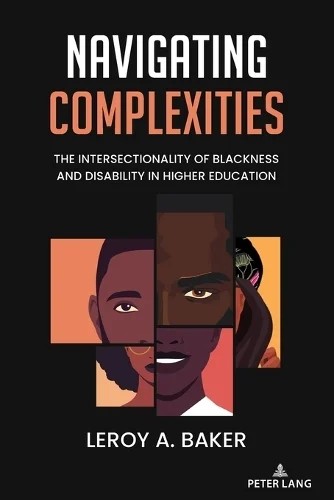My journey to pursue a PhD began with a profound commitment to understanding the challenges faced by Black university students with disabilities in Ontario. During my doctoral research study, I found that Black students who access academic accommodations in Ontario higher education face overwhelming mental health challenges. My research findings inspired me to pursue a post-doctoral fellowship at Queen's, where I aim to gain a deeper insight into Black students' mental health issues in Ontario universities.
Growing up as an abused and neglected youth in Jamaica, I learned firsthand how these obstacles result in social, economic, and psychological marginalization of the abused Black male body. Despite these challenges, I always had a passion for education and recognized its transformative power. After immigrating to Canada, the category of Blackness made my previous challenges more comprehensible. I became interested in the way power, marginalization, and resistance are framed at the intersections of race, Blackness, disability, class, gender, and sexuality. These experiences are part of what motivated me to apply to the Transitional Year Program (TYP) at the University of Toronto, as an entry to postsecondary education and, later, to pursue an undergraduate degree in Equity Studies. During my undergraduate experience, I enrolled in several Equity Studies courses that examined equity and the body, which ultimately encouraged my interest in how individual social position is frequently reflected institutionally. For instance, I became interested in critically examining my early challenges living as an abused youth in Jamaica and my experiences immigrating to Canada, both of which had several unanticipated benefits. First, these critical examinations served to strengthen my personal resolve; second, they afforded me a unique opportunity to gain experience occupying marginalized social and material spaces, and finally, they reinforced my belief in the necessary connection between critical thinking and survival, whether that survival is physical, psychological, or intellectual. Through my Equity Studies program, I gained invaluable knowledge, tools, and theoretical perspectives.

During these courses, I learned that "problem people" are created rather than just showing up. They taught me to understand "the problem" through our specific social positions and link them to disability. I began to see the intricate connections between anti-Black racism and ableism, both of which are deeply rooted in the shared history of colonialism. This historical perspective helped me understand how these forms of discrimination intersect and perpetuate systemic inequities. These courses also introduced me to a structural critique of critical disability studies, anti-colonial studies and Black studies, emphasizing that disability affects us all and that everyone has a place in the conversation. In addition, these courses have significantly enhanced my critical thinking skills, enabling me to evaluate various perspectives and construct well-rounded arguments. Mentoring from great professors has played a pivotal role in this journey, guiding me both personally and academically. The insights they shared with me underscore the exceptional supervision and guidance I received. Their dedication allowed me to intellectually engage with the theory and practices of everyday life and critically examine social justice issues in practice. These critical insights enabled me to pursuit a Master’s in Sociology and Equity Studies in Education and later a PhD in Sociology and Social Justice from the Ontario Institute for Studies in Education (OISE), University of Toronto.
Leroy’s current research: My current research project focuses on Black mental health, equity, intersectionality theory, education, and practice. I am interested in developing and promoting educational practices that foster inclusivity and equity for all students. My work aims to address systemic barriers and contribute to creating supportive environments for Black and racialized students. Through my research, I strive to influence policy and practice in educational institutions at various levels.
The post-doctoral experience at Queen’s: My experience working with my post-doctoral supervisor, Dr. Patricia Douglas, has been an incredibly enriching experience. Dr. Douglas's unwavering dedication to both research and mentorship has significantly shaped my professional growth. Her depth of knowledge and passion in the field of disability studies, inclusive education, decolonial, intersectionality theory and critical autism studies have consistently inspired me to pursue excellence. My work is mutually supportive, with shared goals of decolonizing ableism and anti-Black racism, embracing intersectionality, and fostering an environment where all students can thrive, belong, and succeed.
Dr. Douglas is not only a brilliant scholar but also a remarkably supportive and caring mentor. She has a unique ability to foster an inclusive and collaborative environment, which has greatly enhanced my research project. Dr. Douglas approachable nature and genuine interest in my development have provided me with the confidence to tackle challenging projects and explore innovative ideas. She has been a constant source of encouragement, offering insightful feedback and valuable career advice. Dr. Douglas commitment to my success, both academically and personally, has been instrumental in shaping my post-doctoral experience.
My project on Black mental health offers a unique and valuable perspective that complements Dr. Douglas's research vision. Together, we are dedicated to creating the conditions necessary for student success and wellness, making this collaboration both a perfect fit and a vital aspect of my academic journey. Working with Dr. Douglas has been a privilege. Her caring nature, patience, integrity, and steadfast support have profoundly influenced my post-doctoral journey, making it both fulfilling and transformative.
Looking forward: I am particularly excited about my postdoctoral research project on “Reframing Black Mental Health in Canadian University Discourses”. This endeavour aims to shift perspectives and deepen the understanding of mental health within Black communities in the academic context of Canadian universities. I am also thrilled and excited about the publication of my book, “Navigating Complexities: The Intersectionality of Blackness and Disability in Higher Education”. My book examines the impact of academic accommodations and their reproduction of anti-Black racism and the marginalization of Black university students with disabilities. It offers a sustained look at the systemic and structural barriers confronting Black students with disabilities pursuing higher education degrees in a Canadian university environment.